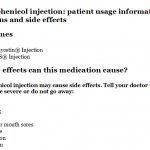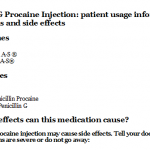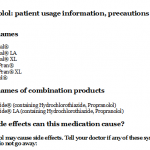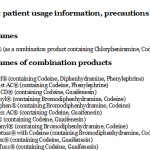
Daunorubicin: patient usage information, precautions and side effects
Tuesday, May 30, 2017 by Gregory Van Dyke
http://www.naturalnewsreference.com/2017-05-30-daunorubicin-patient-usage-information-precautions-and-side-effects.html
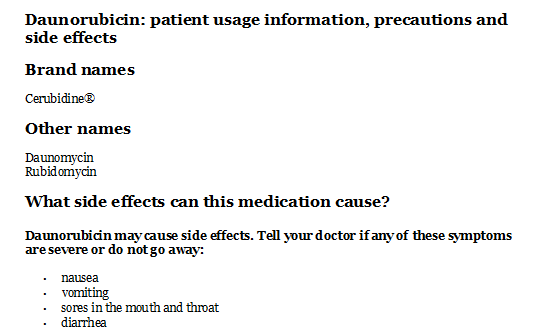
Daunorubicin: patient usage information, precautions and side effects
Brand names
Cerubidine®
Other names
Daunomycin
Rubidomycin
What side effects can this medication cause?
Daunorubicin may cause side effects. Tell your doctor if any of these symptoms are severe or do not go away:
- nausea
- vomiting
- sores in the mouth and throat
- diarrhea
- stomach pain
- hair loss
- red urine
Some side effects can be serious. If you experience any of these symptoms or those listed in the IMPORTANT WARNING section, call your doctor immediately:
- redness, pain, swelling, or burning at the site where the injection was given
- rash
- hives
- itching
- difficulty breathing or swallowing
Daunorubicin may increase the risk that you will develop other cancers. Talk to your doctor about the risks of taking this medication.
Daunorubicin may cause other side effects. Call your doctor if you have any unusual problems while taking this medication.
If you experience a serious side effect, you or your doctor may send a report to the Food and Drug Administration’s (FDA) MedWatch Adverse Event Reporting program online (http://www.fda.gov/Safety/MedWatch) or by phone (1-800-332-1088).
IMPORTANT WARNING:
Daunorubicin injection must be given in a hospital or medical facility under the supervision of a doctor who is experienced in giving chemotherapy medications for cancer.
Daunorubicin may cause serious or life-threatening heart problems at any time during your treatment or months to years after your treatment has ended. Your doctor will order tests before and during your treatment to see if your heart is working well enough for you to safely receive daunorubicin. These tests may include an electrocardiogram (ECG; test that records the electrical activity of the heart) and an echocardiogram (test that uses sound waves to measure your heart’s ability to pump blood). Your doctor may tell you that you should not receive this medication if the tests show your heart’s ability to pump blood has decreased. Tell your doctor if you have or have ever had any type of heart disease or radiation (x-ray) therapy to the chest area. Tell your doctor and pharmacist if you are taking or have ever received certain cancer chemotherapy medications such as doxorubicin (Doxil), epirubicin (Ellence), idarubicin (Idamycin), or mitoxantrone (Novantrone), cyclophosphamide (Cytoxan), or trastuzumab (Herceptin). If you experience any of the following symptoms, call your doctor immediately: shortness of breath; difficulty breathing; swelling of the hands, feet, ankles or lower legs; or fast, irregular, or pounding heartbeat.
Daunorubicin can cause a severe decrease in the number of blood cells in your bone marrow. This may cause certain symptoms and may increase the risk that you will develop a serious infection or bleeding. If you experience any of the following symptoms, call your doctor immediately: fever, sore throat, ongoing cough and congestion, or other signs of infection; unusual bleeding or bruising.
Tell your doctor if you have or have ever had kidney or liver disease. Your doctor may need to adjust your dose if you have kidney or liver disease.
Keep all appointments with your doctor and the laboratory. Your doctor will order certain tests to check your body’s response to daunorubicin.
Why is this medication prescribed?
Daunorubicin is used with other chemotherapy drugs to treat a certain type of acute myeloid leukemia (AML; a type of cancer of the white blood cells). Daunorubicin is also used with other chemotherapy drugs to treat a certain type of acute lymphocytic leukemia (ALL; a type of cancer of the white blood cells). Daunorubicin is in a class of medications called anthracyclines. It works by slowing or stopping the growth of cancer cells in your body.
How should this medicine be used?
Daunorubicin comes as a solution (liquid) or as a powder to be mixed with liquid to be injected intravenously (into a vein) by a doctor or nurse in a medical facility along with other chemotherapy medications. When daunorubicin is used to treat AML, it is usually injected once a day on certain days of your treatment period. When daunorubicin is used to treat ALL, it is usually injected once a week. The length of treatment depends on the types of drugs you are taking, how well your body responds to them, and the type of cancer you have.
Ask your pharmacist or doctor for a copy of the manufacturer’s information for the patient.
Other uses for this medicine
This medication may be prescribed for other uses; ask your doctor or pharmacist for more information.
What special precautions should I follow?
Before receiving daunorubicin injection,
- tell your doctor and pharmacist if you are allergic to daunorubicin, any other medications, or any of the ingredients in daunorubicin injection. Ask your pharmacist for a list of the ingredients.
- tell your doctor and pharmacist what other prescription and nonprescription medications, vitamins, nutritional supplements, and herbal products you are taking or plan to take. Be sure to mention the medications listed in the IMPORTANT WARNING section and any of the following: azathioprine (Imuran), cyclosporine (Neoral, Sandimmune), methotrexate (Rheumatrex, Trexall), sirolimus (Rapamune), and tacrolimus (Prograf). Your doctor may need to change the doses of your medications or monitor you carefully for side effects. Other medications may also interact with daunorubicin, so be sure to tell your doctor about all the medications you are taking, even those that do not appear on this list.
- tell your doctor if you have or have ever had any medical condition.
- tell your doctor if you are pregnant, plan to become pregnant, or are breast-feeding. You should not become pregnant while you are receiving daunorubicin injection. If you become pregnant while receiving daunorubicin, call your doctor. Daunorubicin may harm the fetus.
What special dietary instructions should I follow?
Unless your doctor tells you otherwise, continue your normal diet.
In case of emergency/overdose
In case of overdose, call your local poison control center at 1-800-222-1222. If the victim has collapsed or is not breathing, call local emergency services at 911.
What other information should I know?
It is important for you to keep a written list of all of the prescription and nonprescription (over-the-counter) medicines you are taking, as well as any products such as vitamins, minerals, or other dietary supplements. You should bring this list with you each time you visit a doctor or if you are admitted to a hospital. It is also important information to carry with you in case of emergencies.
Why is this medication prescribed?
How should this medicine be used?
What special precautions should I follow?
What special dietary instructions should I follow?
What side effects can this medication cause?
Tagged Under: Tags: chemical medicine, medication, Pharma, Prescription Medicine

